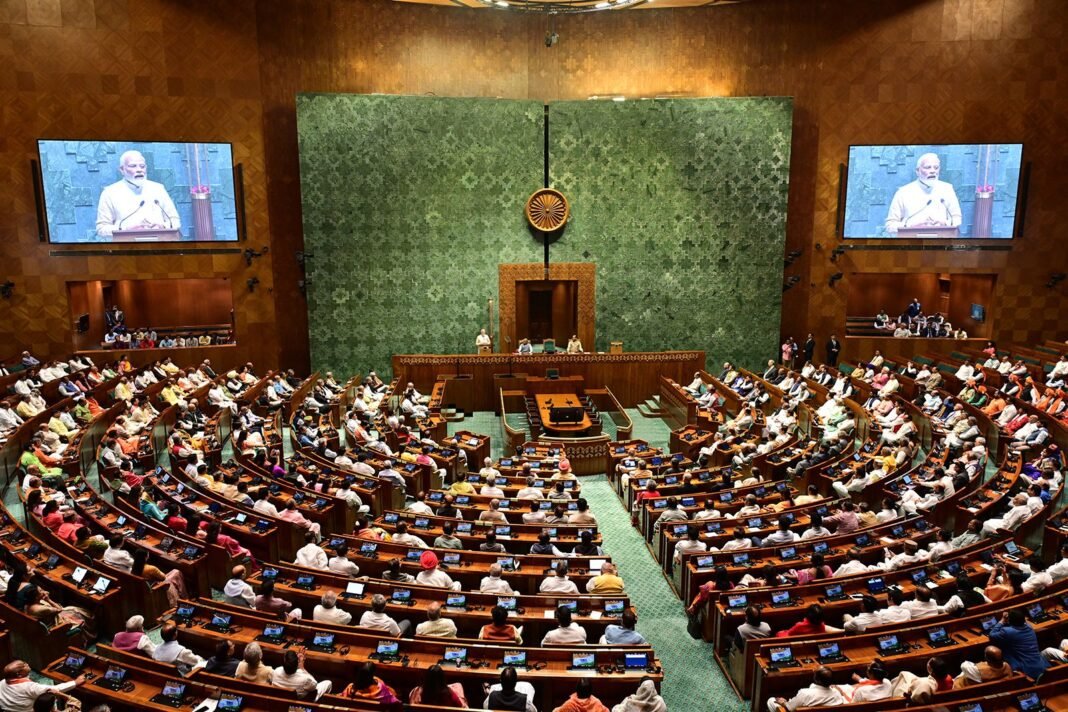The Monsoon Session of the Indian Parliament kicked off today, July 21, with signs of intense political confrontations ahead. Set to run until August 21, the session comes at a time when the political climate is charged over several sensitive national and international issues.
Parliamentary Affairs Minister Kiren Rijiju, speaking ahead of the session, called on all political parties to ensure smooth and productive proceedings. “The functioning of Parliament is a shared duty of all parties, regardless of their ideology,” Rijiju stated. He emphasized the need for constructive debate and cooperation, especially given the pressing matters on the table.
Government Faces Demands for PM’s Clarification
Tensions began rising even before the session started, during an all-party meeting convened by the government on Sunday, July 20. The opposition INDIA alliance demanded that Prime Minister Narendra Modi personally address Parliament on multiple controversial topics, particularly ‘Operation Sindoor’—a military action whose details remain under wraps—and the ceasefire agreement with Pakistan following cross-border hostilities earlier this year.
Adding fuel to the fire, recent statements by former U.S. President Donald Trump have stirred political waters. Trump has repeatedly claimed that the ceasefire was possible due to American mediation—an assertion that India has officially denied, calling the agreement “entirely bilateral.” Nevertheless, opposition leaders insist that the Prime Minister clarify India’s stance in Parliament.
According to sources cited by PTI, the government is open to discussing Operation Sindoor during the session. The opposition had previously sought a special session to deliberate on the ceasefire, but that request was rejected. Now, this session marks the first opportunity for Parliament to formally debate the matter.
INDIA Alliance Sets the Tone
On July 19, just days before the session, the INDIA alliance held its own internal meeting to coordinate strategy. In a joint statement, alliance leaders listed a range of issues they intend to raise during the session. These include the Pahalgam terror attack in Jammu and Kashmir, the SIR (Selective Identification of Residents) policy in Bihar—which critics claim could disenfranchise millions—ongoing challenges in Manipur, and foreign policy missteps.
Congress MP Gaurav Gogoi, speaking after the all-party meeting, reiterated the alliance’s demand for Prime Minister Modi’s presence in the House during critical discussions. “It is a matter of moral responsibility. The country expects its leader to face Parliament, especially when questions arise on national security, democracy, and international diplomacy,” he said.
He also expressed concern over the functioning of the Election Commission, alleging that recent developments had cast doubt on its neutrality. Gogoi added that the INDIA bloc would push for answers regarding the government’s approach to delimitation and the alleged targeting of marginalized communities across the country.
Rijiju Responds, Emphasizes Procedure
In response to the opposition’s demands, Minister Rijiju posted a video on social media platform ‘X’, calling for responsible conduct from all sides. “We are open to discussing every important issue, including Operation Sindoor,” he said, but insisted that debates must remain within parliamentary rules. He added that while the Prime Minister is generally present when not abroad, it is not feasible for him to respond to every issue personally. “That is why ministers are appointed—to speak on behalf of the government,” Rijiju said.
He also revealed that the government may table up to 17 bills during this session. These proposed legislations cover a range of sectors, though their full details have not yet been disclosed.
Regional Voices Join the Chorus
Other parties have also voiced their priorities. Samajwadi Party leader Ram Gopal Yadav demanded an explanation from the government about the intelligence failure that preceded the Pahalgam attack. “The Lieutenant Governor of Jammu and Kashmir has acknowledged lapses. Parliament deserves to know the full picture,” he said.
On Trump’s ceasefire comments, Yadav asserted, “India has never accepted third-party mediation in Pakistan-related matters. These statements must be officially addressed.”
BJD’s Sasmit Patra highlighted the deteriorating law and order situation in several states, urging the government to permit an open discussion.
From Jammu and Kashmir, National Conference MP Altaf Hussain announced his party’s intent to spotlight the region’s growing tensions. “After the Pahalgam attack, there’s a disconnect between what’s presented and what’s real on the ground. Innocents are being harassed, and that must stop,” he warned.
As the Monsoon Session unfolds, the stage is clearly set for a fierce battle of words and ideas, with national security, electoral integrity, and federal accountability at its heart.








